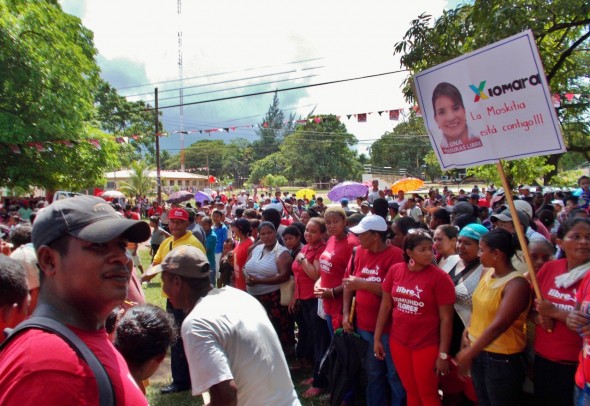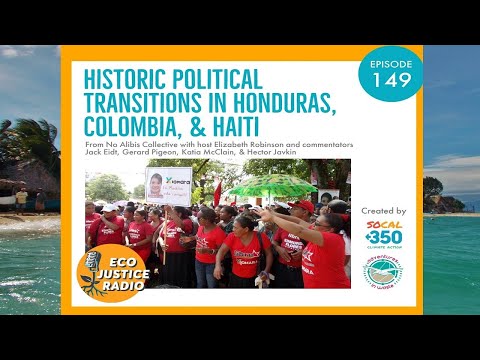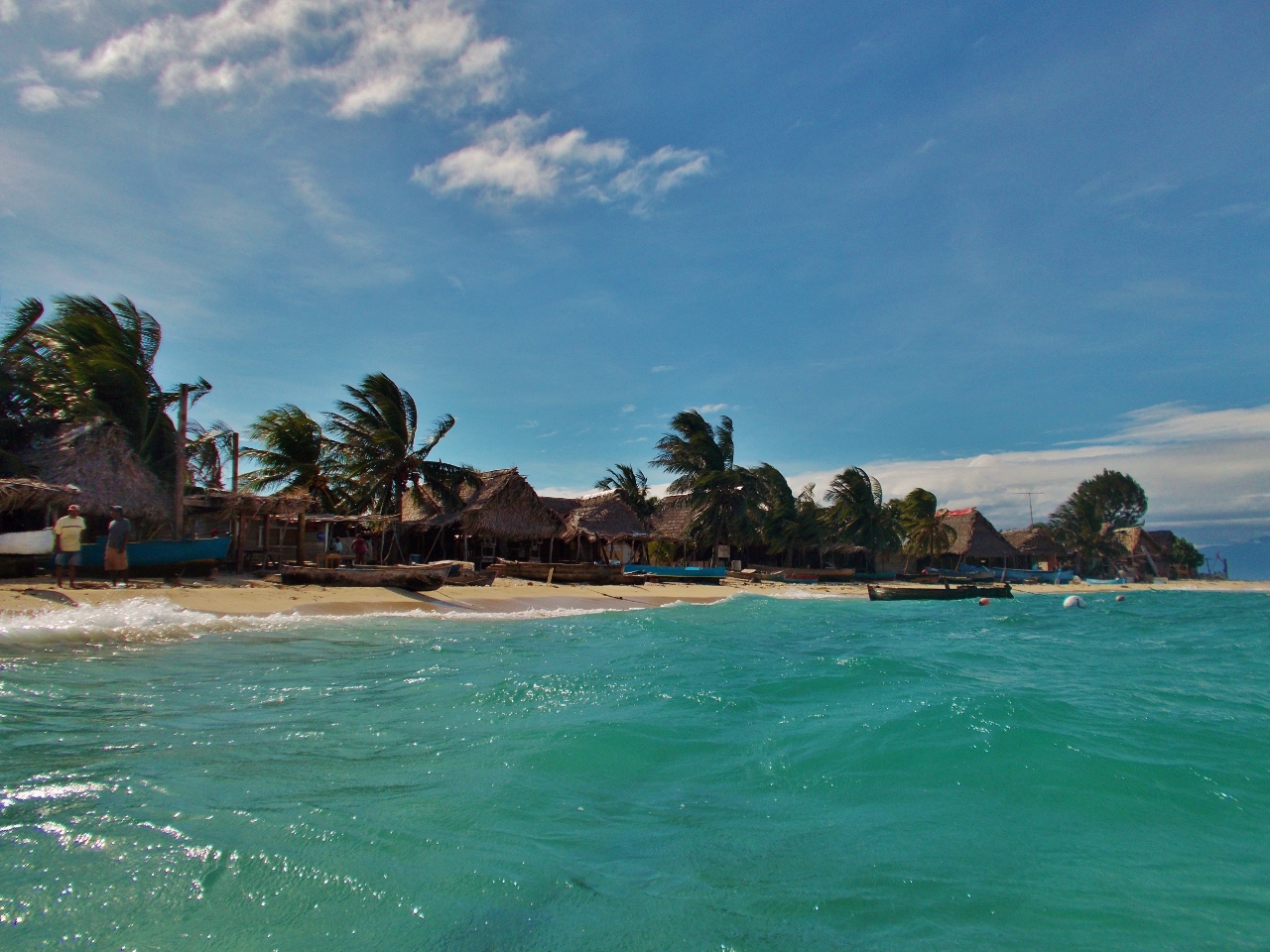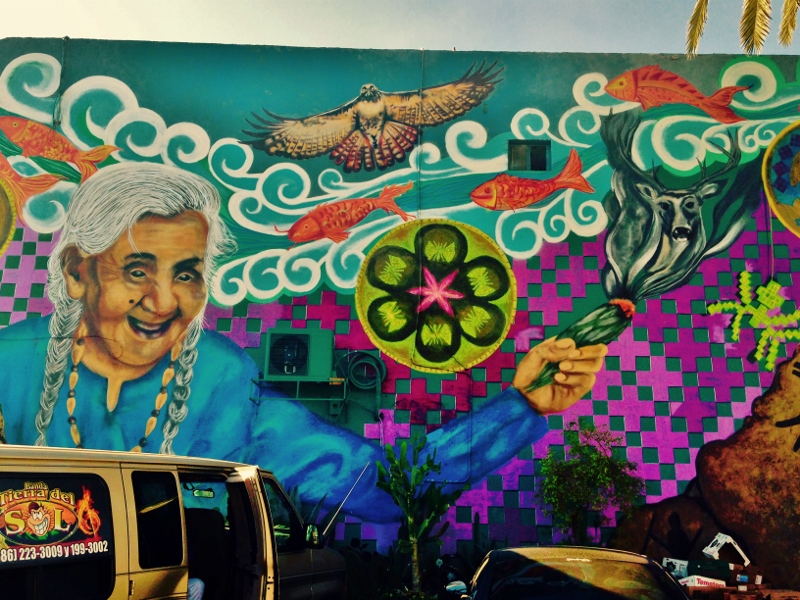

Subscribe to EcoJustice Radio:


News Review on Historical and Political Transitions in Central America and the Caribbean
Two countries in Latin America have had elections where after decades of US-influenced, multinational corporation dominant governments have lost to insurgent leftist candidates, Xiomara Castro in Honduras, and Gustavo Petro in Colombia.
One other country in the Caribbean, Haiti, has faced the same sort of right-wing neoliberal interventionist governments, a recent example ending up with an assassination of President Jovenel Moise in 2021. Right now massive protests have gotten to the point of anarchy over fuel hikes and US-UN intervention on behalf of corporations and their wealthy Haitian overlords. How did we get here and where do we go from here?
On this show, we feature excerpts from the UCSB radio program No Alibis Third World News Review with host Elizabeth Robinson, Jack Eidt, EcoJustice Radio Executive Producer, and commentators Gerard Pigeon, Katia McClain, and Hector Javkin.

Watch this video on YouTube
Political Transitions in Honduras and Colombia
Jack Eidt discusses new government transitions in Honduras and Colombia.
Honduras. The 2009 military coup that ousted Xiomara Castro’s husband, democratically elected president Manuel Zelaya, plunged Honduras into chaos. The resulting death, destruction, and suffering caused by this far-right regime is incalculable, sustained by military force, financed and trained by the US, and advanced by brazen electoral fraud.
The dictatorship led to the transformation of Trujillo once a sleepy coastal town with multiple Garifuna villages into a bustling destination for Canadian sun worshipers and cruise ships. And La Moskitia, inhabited by the Miskitu, Pech, Tawahka, and Garifuna, has been transformed into a drug transshipment zone, like a free trade zone for traffickers.
We also discuss the inequality and repression committed against the Afro-Indigenous Garifuna communities, traditional inhabitants of the Cayos Cochinos area of the Bay Islands off the Carriage North Coast of Honduras, have been prohibited from fishing in favor of privatization of the multiple cays in the area for ecotourism and specifically the Spanish reality show “Superviventes” or their version of Survivor.


One of the Garifuna activists summed it up: “The foundation, enforced by the national Coast Guard, told me that it was illegal to fish there, but when the reality show is filming, and the Spaniards and Italians come, they get to scoop up whatever’s in front of them. They can take whatever they want. I’ve seen it. They even eat the sea urchins and snakes.” He gritted his teeth and tightened his face as he recounted his run-ins with the Coast Guard, which everyone here simply calls “the Foundation boat.” — El Faro report on Cayos Cochinos
Colombia. Gustavo Petro is Colombia’s first ever left-wing president. He is a former revolutionary with the socialist armed movement M-19, which signed a peace treaty and demilitarized. Petro subsequently established himself as a lawmaker and became mayor of the capital Bogotá. His vice president is Francia Marquez, according to her own description, the first “black, Afro-descendant, native of the most impoverished regions” of Colombia to become VP.
A recent report from the North American Congress on Latin America (NACLA) told how the new government calls for negotiations with armed groups and new approaches to the war on drugs that includes affected communities. He also plans to open dialogue around three main issues: protection for the Amazon rainforest; ending the war on drugs; and moving the Colombian economy away from extractive projects such as fossil fuels.
Unfortunately, the Biden Administration has doubled down on pressure on oil and gas drilling the region of Arauca in eastern Colombia on the border of Venezuela. Previous administrations have designated about 80 percent of the department as an oil concession, which has resulted in massive destruction
By taking advantage of institutional weakness and bribing local officials, transnational corporations like Occidental Petroleum have been able to ignore environmental regulations, dumping tens of thousands of barrels of contaminated water into the flood zones of Caño Limón and the Arauca River, destroying the vegetation and biological resources in the headwaters of the Cinaruco and Capanaparo rivers.
The Petro and Marquez Administration, and the people of Colombia, have lots of work to do to restore democracy and protections to communities and ecosystems.
Historic Foreign Intervention and Injustice in Haiti
Professor Gerard Pigeon covers the history of Haiti, and why we have seen this international-interventionist mess before. Unless many nations work together to support a Haitian-led solution, where the business and corporate interests and their US and UN military power step back, nothing will improve there.
We also included a commentary by Prof. Katia McClain, calling for a peaceful solution to the war in Ukraine.
Jack Eidt is an urban planner, environmental journalist, and fiction writer. In addition to co-founding SoCal 350, he publishes the website WilderUtopia. He has written about Latin American issues for decades.
Gerard Pigeon is Professor Emeritus in the Department of Black Studies at UCSB, and specializes in Francophone African and Caribbean literature, language, and cultural traditions. He gives us a comprehensive rundown on Haiti’s history since they became an independent republic, the first modern state in the Americas governed by people of African descent. And he covers what is happening today since the assassination of their president and ongoing political instability. He has published many books including Favelas (Les Editions St. Germain), Le Choix, Edition St. Germain; and Frontiere (Oswald, Paris, 1976).
Katia McClain is a Lecturer in the Department of Germanic and Slavic Studies at UCSB.
More Info:
Rights Action: https://rightsaction.org/
Reviving Democracy in Honduras: https://jacobin.com/2022/07/honduras-socialist-president-xiomara-castro-democracy-libre-party
Repression in Cayos Cochinos: https://elfaro.net/en/202207/centroamerica/26304/The-Survivors-of-Cayos-Cochinos.htm
Total Peace in Colombia: https://nacla.org/petro-new-peace-plan-colombia
Struggles Over Oil in Arauca: https://nacla.org/dirty-war-oil-arauca-colombia
For an extended version of this interview and other benefits, become an EcoJustice Radio patron at https://www.patreon.com/ecojusticeradio
Podcast Website: http://ecojusticeradio.org/
Podcast Blog: https://www.wilderutopia.com/category/ecojustice-radio/
Support the Podcast: https://www.patreon.com/ecojusticeradio
Show originated from UCSB No Alibis
Commentators: Elizabeth Robinson, Jack Eidt, Gerard Pigeon, Katia McClain, and Hector Javkin
Intro and Executive Produced by Jack Eidt
Engineer and Original Music: Blake Quake Beats
Episode 149
Photo credit: Jack Eidt








